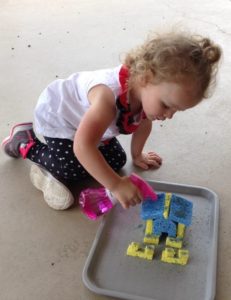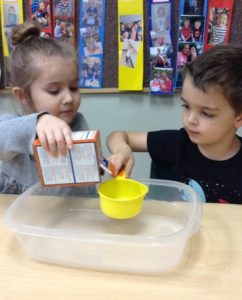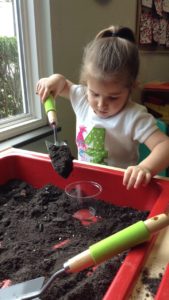Learning Through Play
Children across generations no matter their race, culture, or gender participate in play: enjoying games, inventing stories, imagining and creating worlds within their world.
Psychologist David Whitebread of Cambridge University states “Play is essential to their development. They [children] need to learn to persevere, to control attention, to control emotions. Kids learn these things through playing.” (Kohn, 2015).
Behavior research connects play to children’s development at several levels: linguistically, cognitively, mathematically, scientifically, and socially. Young children do not distinguish between play and learning.
In fact, children learn best through play because play provides key elements which must be present for learning to occur:
- Participants are mentally active (not passive)
- Participants are engaged (not distracted)
- Participants are socially interactive (with peers or educators)
- Participants are building meaningful connections to their lives (Hassinger-Das et al. 2017)
When children learn through play, the educator takes on the role of facilitator, providing opportunities for discovery-based learning through guided play. Guided play allows children to freely choose what to play with the addition of focused learning goals.
At Stepping Stone School, we promote play through the creation of a safe play environment both indoors and outdoors. Our educators provide a wide variety of play experiences allowing children to try new things, ask questions, get messy, sing, dance, and explore. Our Platinum Learning for Life ™ curriculum incorporates a hands-on approach to learning fueling creativity and curiosity. Children are provided with ample time to freely choose how they will play. Teachers target their instruction through playful learning experiences providing support as needed. Our caregivers value play, commenting on what the children are learning as they are playing.



Through play, children learn and develop
- Cognitive skills: while pretending to grocery shop children identify numbers, count, develop concepts of money and compare objects.
- Physical abilities: running, climbing, jumping, kicking and throwing while playing outside.
- Social skills: cooperative games, social problem solving, and conflict resolution are important skills developed through social interaction.
- Literacy skills: narrating stories through play, taking orders at a pretend restaurant, and practicing new vocabulary words.
As Italian physician and educational philosopher Maria Montessori stated, “Play is the work of the child.” At Stepping Stone School we take that work seriously through playful learning experiences each and every day.
Resources:
Bongiorno, L. (2007). “10 Things Every Parent Should Know about Play.” National Association for the Education of Young Children. Retrieved on May 17, 2017 from https://families.naeyc.org/learning-and-development/child-development/10-things-every-parent-should-know-about-play
Butler, S. (2007). “Learning Through Play.” Earlychildhood News. Retrieved on May 17, 2017 from http://www.earlychildhoodnews.com/earlychildhood/article_view.aspx?ArticleID=591
Hassinger-Das, B; Hirsh-Pasek, K; and Golinkoff, R. (May 2017). “The Case of Brain Science and Guided Play: A Developing Story.” Young Children. Vol. 72 No. 2. Retrieved on May 17, 2017 from http://www.naeyc.org/yc/article/case-brain-science-guided-play
Kohn, D. (2015, May 16). “Let the Kids Learn Through Play.” Retrieved on May 17, 2017 from https://www.nytimes.com/2015/05/17/opinion/sunday/let-the-kids-learn-through-play.html